
*
Steve Kazee, the Broadway actor who shot to greater fame in 2012 when he was named Best Actor in a Musical for playing a broken Irish troubadour named Guy in Once, went silent in February. In more ways than one.
In early February, following a week's vacation from the Tony-winning Best Musical, he was experiencing vocal issues that had surfaced earlier. On doctor's orders, he said, he went on vocal rest, dropping out of the musical for what he thought might be a limited time. But the vocal rest lasted for more than seven weeks, with Kazee also going silent on his busy Twitter account since Feb. 14 (he's got 17,000 followers and he had tweeted more than 7,590 times by February, not counting any potential deletions). By agreement with the Once producers, who were assessing casting options during his illness, he did not speak to media until March 25, the day after his (and co-star, Tony nominee Cristin Milioti's) exit from the show was official. (The producers announced on March 18 that Ben Hope, Kazee's standby, who had played performances in his absence, would graduate to the role of Guy full-time on March 26. Original cast members Will Connolly and Tony nominee Elizabeth A. Davis also exited March 24.)
Kazee's silence in the Twitterverse raised eyebrows, proving the power of social media to fuel negative speculation and/or inspire caregiving. Why would an actor who has tweeted @SteveKazee more than 7,000 times suddenly stop? Was he in crisis? Was he in rehab? Was the pressure of carrying a vocally demanding show catching up with him? After all, his time since the 2011 A.R.T. tryout of Once (which later moved to Off-Broadway's New York Theatre Workshop, then Broadway) had been crowded with incident: He'd Tweeted about health issues (Lyme disease and an ailing shoulder, both mentioned by him in Tweets in 2012); his mother, Kathy, died of cancer shortly before he won the Tony Award last spring; he was dating pop star Christina Perri last year and sang a duet with her, "A Thousand Years," on the latest "Twilight" soundtrack (they stopped dating last fall in what he calls "just a normal didn't-work-out situation"), to say nothing of the earlier public breakup with "Smash" actress Megan Hilty, his longtime girlfriend (they both released amicable, mutually respectful statements at the time).
Kazee, 37, told Playbill on Monday, March 25 that he'd heard all the rumors. He's setting the record straight. Hours after this interview was conducted, he posted an open letter "to the fans" on SteveKazee.com, recapitulating some of what he shared here (scooping Playbill!). He also tweeted a link to his open letter. (Welcome back, Steve!) *
| |
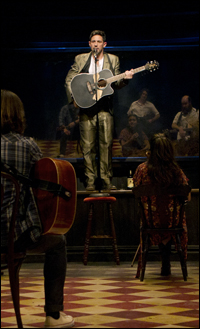 |
|
| Kazee in Once. | ||
| photo by Joan Marcus |
You've been on vocal rest?
Steve Kazee: I have been on vocal rest, yes, since February the sixth, actually. I'd gone on vacation…the end of January, first week of February. And I got back on Sunday and went back into the show on Tuesday [Feb. 5], and on Tuesday night I felt a little rough…
Before I went on this vacation I was starting to feel fatigued, vocally. We'd been going on for so long, almost a year and a half at that point, and, you know, I was starting to definitely feel the pressure of the role a little bit on my vocal cords. So I thought I should probably take a little vacation to try and build up some steam, moving forward. So I went on vacation, I came back, went back into the show, and on that Tuesday night I just didn't feel great, I felt like I should've felt better after a week's rest. So the next day I went into my vocal lesson, which I have every week with Liz Caplan, who has been wonderful and the sole reason that I was able to do the show as long as I [have]. I went to her on Wednesday morning, and sort of listened around and tried to see what was going on with it and we felt like maybe go into the matinee and try to see what it was. And I went into the matinee [Feb. 6], and unfortunately right off the bat, I knew something just wasn't right. I didn't have the notes I had had so effortlessly. So I pushed through the first act, got to intermission and I definitely, at that point, could tell that something was wrong. I thought, "Well, let me just finish the show and I'll got to the ENT [ear, nose and throat doctor] between the matinee and the evening, and we'll go from there." I went to the ENT and, unfortunately, saw that I was starting to develop a little bit of a bump on my vocal cords.
And the biggest problem was I had a blood vessel that was stretched over it that was enflamed quite a bit and was pretty precarious. Had I continued on without seeing an ENT, I ran the risk of hemorrhaging the vocal cord. So the decision was made to put me on a week's vocal rest. I went back the following week to see the ENT again. I got scoped again. It had improved some but it was still apparent that I needed some more time, so we decided at that point that we'd take another week, possibly two, then I went back again, got scoped again and this just kept happening for four weeks. At that point I'd already come to the end of my contract.
| |
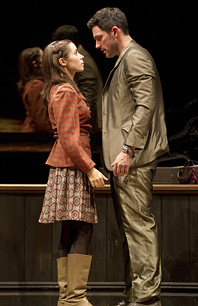 |
|
| Cristin Milioti and Steve Kazee in Once. | ||
| Photo by Joan Marcus |
SK: Yeah, yeah. We were just trying to figure out the best way for me to move forward; what was best for me health wise, what was best for the show. Ultimately I decided, along with my doctor and agent and managers, that moving forward and continuing to sing the same role and running the risk of doing some permanent damage to my vocal cords just wasn't the best for me, health-wise or career-wise. …You know, I mean, my voice is my income, is my livelihood. So we decided not to move forward."
My intention was to stick around until September. I was very happy there. As you can probably imagine, I've loved that show and loved that company and loved performing that role so much over the past two years. You know, this has been a very difficult month and a half for me of being up and down emotionally and feeling broken, and feeling like you don't know how to fix what's wrong with you. Things you used to be able to do so easily are now a struggle for you. So, you know, I had to make a very tough decision about my own welfare, and moving forward.
The production was wonderful in the way that they handled the whole situation as far as my health was concerned. No one was bearing down on me to make a decision or get myself back to the show. Anyone who's seen the show since knows that Ben Hope is one of the most fantastic standbys you could ever ask for, and the job that he did stepping in for me the entire time was just unbelievable. So I think they felt like they were in a good position. We were all just willing to wait and see if I'd be able to come back, and ultimately I wasn't able to do that.
Last fall, did you get your throat "scoped" just to check on cords, for the sake of maintenance? Or were you sort of plowing through the show?
SK: No, no, no — I am a person who constantly checks on myself. I was scoped in January 2012, right after the New York Theatre Workshop run, because I wanted to see where I was, health-wise, moving forward. And then I was scoped again in the fall of 2012, after the Tonys…and at that point my voice had held up superbly, and I had zero issues, zero problems. I think what might've led to the downfall is just the change of season, heading into the holidays, the pressure of the holiday schedules — and you know you're doing a lot more, extracurricularly.
| |
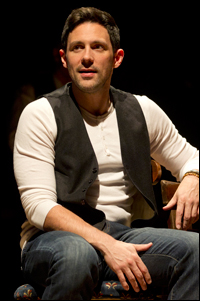 |
|
| Kazee in Once. | ||
| photo by Joan Marcus |
SK: Well, I tell you, it was one of the worst seasons I've ever had as far as sinus infections go and just like general ick. And, you know, also, it's just the wear and tear — it was the hardest role I've ever sung in my life and will most likely always be the hardest role I've ever sung in my life. Do you burn the candle at both ends, personally? Are you up til 3 AM?
SK: Oh, no. I think anybody who knows me will tell you that over this past year and a half I have been a monk. I [went] home right after the show, I didn't have dairy…I was basically on a vegan diet for four or five months. I was constantly, constantly, constantly taking care of my voice because when I first got this job in April of 2011, I knew right then and there that this was gonna be the hardest job I'd ever had, and I made a decision to personally commit myself to that role more than I've ever committed myself to anything else. I knew the potential of it to be a great show and I knew the potential of the role to be one that was going to wear me out.
A lot of my friendships, a lot of my professional and personal relationships — not necessarily romantic — suffered because of that commitment, because I wasn't able to go out, I wasn't able to go and participate in a lot of the things that a lot of the community can go participate in. So I was very much home after the shows. I would sleep as much as possible. I was just very good, and I took very good care of myself, which I also think is what allowed me to sing the role for a year and a half and not have any problems at all.
| |
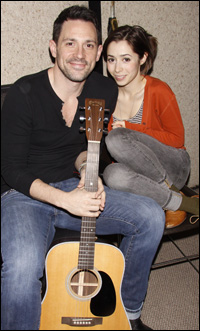 |
|
| Kazee and Cristin Milioti in the recording studio. | ||
| Photo by Joseph Marzullo/WENN |
SK: No, I've never been on prednisone, [Dr. Gwen Korovin] did not wanna put me on prednisone because of the blood vessel. The blood vessel makes it a little trickier. If it were just swelling of the vocal cord, then we could've probably done prednisone, but it's a common misconception in our business that prednisone is a cure-all . Prednisone doesn't actually treat the issue, prednisone just takes the swelling down. So let's say I take prednisone and I get back into the show and I'm singing the same way, I'm just gonna get back to the place that I was at —
Potentially still damaging your instrument.
SK: Right, exactly.
So, how do you move forward? What's coming up? Are you auditioning?
SK: Yeah, I'm auditioning. Not really for musicals. I'm keeping the singing down to the minimum at the current time. But as far as my vocal cords go at this time, I feel like I'm 80 or 90 percent. It's not a question of whether I was ever going to sing again or whether this was going to be a lasting issue. We always knew, I always knew, the producers always knew that I would get back to a place of being completely fine. The question was always, "Well, once I get back to 100 percent. Do I go back into the show and risk getting back to where I was at?" It was never: "Oh, is he gonna be OK?"
You disappeared from view. No social media.
SK: I think, unfortunately, a lot of people like to speculate on things. I think my absence from social media has only been adding to that speculation. When you're out of the show, that's a very hard thing for an actor. You feel as if you've done a disservice, so I didn't want to be seen as [being] out of the show but yet you're out tweeting, Facebooking, talking about this and talking about that, making it seem like I was just happy as a clam — 'cause I wasn't.
I was very upset with the whole situation and I felt very bad that people were coming to see me and I wasn't there. You feel a lot of pressure in that situation. You feel that being a part of a Tony Award-winning musical: You're there to be there, to perform! I made the decision, along with talking to the producers, talking to my own team of managers and agents, to just be quiet for awhile and to just lay low. I didn't want to be out and about in New York. I have basically been in my apartment for a month and a half.
| |
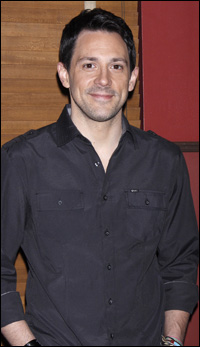 |
|
| Steve Kazee | ||
| Photo by Joseph Marzullo/WEN |
SK: I've never really thought about it in that way. Social media is its own sort of thing: Twitter and Facebook have changed the way everyone perceives everything. [People] automatically think they have an insight to who you really are because of things that you're tweeting or the things that you're Facebooking. For me, Facebook and Twitter was always just a way for me to reach out to the fans of the show, to communicate with my friends who where in the business, and I never felt like I wanted to use it to further my career in some way. I don't know that it has the power or the ability to do that. I just never thought about it in those terms. [My recent silence was about me] just trying to be respectful [to the show].
I made the decision to sort of back off and to sort of wait and see how things were gonna progress before I made any kind of announcement or statements about my future. More than anything I just wanted to be respectful of the people who were still there doing their jobs every night. I didn't want my company to look at me as someone who was just at home tweeting about "The Walking Dead" or something…
| |
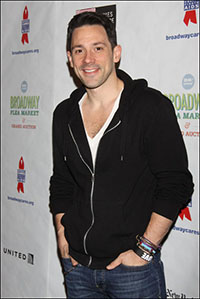 |
|
| Kazee at the 2012 Broadway Flea Market | ||
| Photo by Joseph Marzullo/WENN |
SK: [Laughs.] Absolutely. Are you kidding me? Every other day someone sends me an email that's, like, "I hear you're in rehab…" or — I mean there's just been so many. I found them very entertaining. It's amazing what people's minds can come up with when you just haven't been on Twitter. I think people start worrying that you're dead, people start worrying that — My favorite is that I'm in rehab because I don't know what I would be in rehab for! I do absolutely nothing that could put myself into — maybe, like, for video game addiction. I played a lot of "Call of Duty" while I was at home.
There are certain people who just want to muckrake. They just wanna be in there and they just wanna be starting those things because, unfortunately, when you have a certain amount of good grace come your way….we live in a society where people then want to start to tear that down. When my mom passed away, and when the Tonys and all that was happening, there was a lot of good grace that came my way, and it was lovely and it lifted me up and it carried me through a lot of that stuff.
They wanna see you fail after you've succeeded, and so I think people just reached out and say a lot of different things. Now could I sit here and list 1001 reasons why I'm not in rehab… I could sit here and prove it all day long but it's just not worth it to even go into that frame of mind. Anybody who really knows me knows exactly what's been going on. They know that they've either talked to me or they heard from me via email or text.
Do you think you'll return to social media?
SK: Somebody asked me that last night. They were like, "So everything is said and done, last night was the official goodbye of [four original Once principals]…" It's actually been a really nice respite to not be in my phone all the time and to not be constantly checking social networks and seeing who said what and [who] posted this and posted that. It was a hard two months, but it was also a chance for me to sort of decompress a little bit from the past year. It was a very difficult year on a lot of levels and it was nice for me to just be able to walk away from Twitter and Facebook for a while. I don't know, you know I may come back and I may start tweeting today!
| |
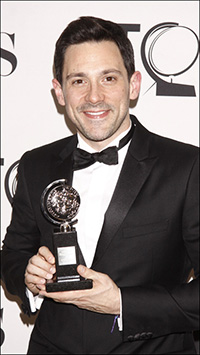 |
|
| Kazee on Tony night | ||
| photo by Joseph Marzullo/WENN |
SK: I definitely see that, but I will tell you this: Anybody who really knows me as a human being knows that it was a difficult year on a lot of levels, and I'm coming up on the one-year anniversary of losing my mother. I can tell you that the days didn't get any easier over the past year. I have a wonderful, lovely friend who said to me once: "There's no doubt in my mind that you are built for adversity because I don't know how many people could've gotten through what was going on." I'm not trying to pat myself on the back. You know, but I never stopped. I never went and allowed myself to suffer and you know I went through a lot of ups and downs and I went through a lot of emotional highs and lows, but at the end of the day I always had that show to go to, and that show was the thing that kept me going. Now, as far as [my pain] being a contributing factor to the role — I'm not that method of an actor. I don't go into a show and really wear it home and take the role with me. I'm a performer. I'm pretending to be someone else. I'm not putting my own self into the show every night. So for me, the show wasn't adding to my stress. it was actually helping to relieve my stress and helping to take away a lot of the pain. When you're up there making that music and you're playing those songs with that group of people, you can't help but feel better. you know?
| |
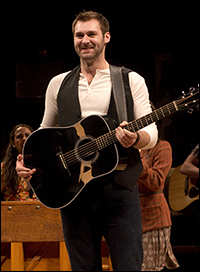 |
|
| Ben Hope as Guy in Once. | ||
| Photo by Monica Simoes |
SK: Well, you know, it's hard. It was a very tough thing to not be able to be there for the last show. My goodbyes to the cast were personal, but I reached out to everyone and explained the entire situation and everything that had happened. Everyone knew exactly what was happening and knew where I was at and knew everything was OK. Yesterday was a very tough day because it's a hard thing when you lose someone from a company, but when you lose four of an original company of such a wonderful time and such a wonderful era in all of our lives, it's just, it was just a very difficult day. I was sad, I was very sad to not be able to perform my last show.
You did not attend Cristin and Will and Elizabeth's final performance?
SK: I was not there, no. I would've felt uncomfortable being here. Because Ben Hope is playing that role right now and Ben Hope is an amazing actor and an amazing performer, and I don't want to be the guy who shows up and takes away from that in any way. I'm gonna have my chance to go and see the cast and have dinner with them or talk with them on a one-on-one basis. So to show up yesterday I just thought would've been a spectacle more than anything. Because you know then the question becomes, "Well, if you're here why aren't you performing?" I said goodbye to them over email…
Are you still meeting with your vocal coach, Liz Caplan?
SK: I haven't seen her since I got injured, but we just talked the other day about getting together and having a little sing-through and seeing where my voice is at. And she is — and please put this in bold print — one of the major reasons why I was able to do that show for as long as I could. I will recommend her for the rest of my life as someone who knows the voice, knows the body, and more importantly knows the mind and the heart and helps you learn how to sing out from those two places. And not necessarily from your instrument. She's brilliant. She's like a therapist! She's like a therapist and a vocal coach wrapped into one. So I do plan on seeing her soon and just catching her up on everything.
| |
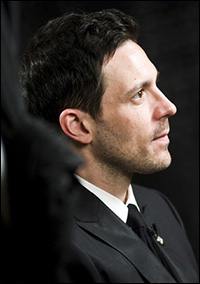 |
|
| Kazee gives an interview at the 2012 Tony nominee luncheon. | ||
| Photo by Monica Simoes |
SK: The only thing that this has done for me is make me realize that this career is not the be all/end all. You have to have a life. And life has to go on when your voice shuts down on you, and you have to take a break from what you're doing for a career. You quickly realize that your career cannot be everything to you. And so I've just been sitting and thinking. I've had a lot of time to think. You think about where you wanna go. You know, I'm 37 years old, and I think about where I want to be in the next five years, what do I want to be doing. Do I want to be in New York? Do I wanna go back to L.A.? There's never been a question of not being a part of this business or not being a part of this industry — I love it — it's in my blood, it's always been in my blood, it's just a part of who I am. For me, it's all about figuring out what's next.
And what's coming up for you in the next couple of weeks?
SK: Not much, really, just rest. I'm going to try to see a lot of shows, because I have nothing but free time right now. I haven't seen anything because, again, I didn't want to be out and about, and so there's a lot of stuff that I really wanna see — I'm excited to see Matilda and Hands on a Hardbody, and Pippin is coming up, which I'm really excited for.
What about a job?
SK: If something comes up and something comes along, and it's something that I love and something that I want to do, then I'm more than willing to jump on board, but I don't feel the pressure to repeat success. I've just been looking forward to seeing what comes down the road. It's constantly changing in this business, and that's the one thing I always tell people: "You'll know you can't do this anymore when you don't get excited about the possibility of tomorrow." Every day I wonder what's gonna happen tomorrow. I wonder what job offer or what audition will come. It's a really exciting thing to think about.
(Kenneth Jones is managing editor of Playbill.com. Follow him on Twitter @PlaybillKenneth.)









